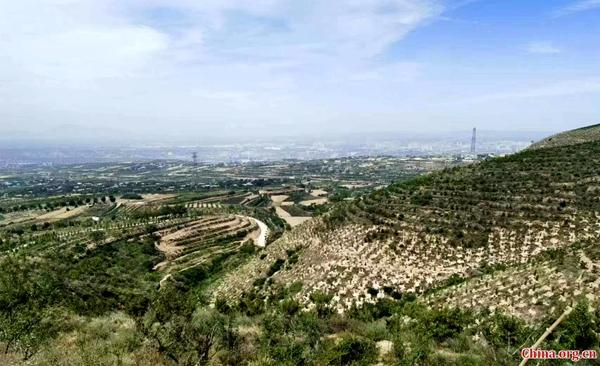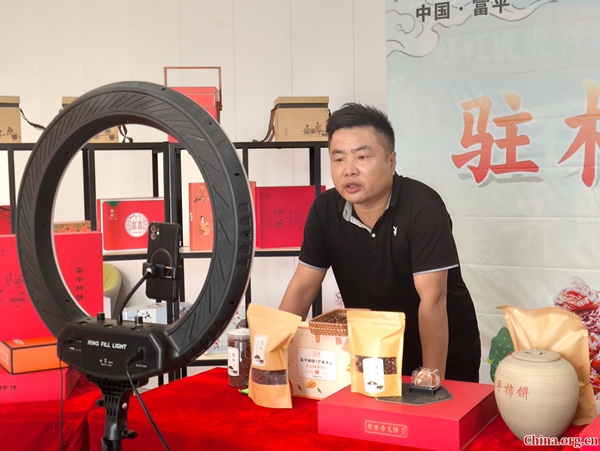
 0 Comment(s)
0 Comment(s) Print
Print E-mail China.org.cn, June 23, 2024
E-mail China.org.cn, June 23, 2024
China has successfully reduced the total area affected by soil erosion to 2.6 million square kilometers, while simultaneously increasing the country's soil conservation rate to 72.6%, Chen Mingzhong, director general of the Department of Rural Water and Hydropower at the Ministry of Water Resources, recently announced at a press conference.
This achievement is a direct result of embracing the philosophy that lucid waters and lush mountains are invaluable assets, with Zhuangli town in Fuping county, northwest China's Shaanxi province, exemplifying this success.

A scene of the soil conservation project in Fuping county, Shaanxi province, June 22, 2024. [Photo by Xu Xiaoxuan/China.org.cn]
Zhuangli town has transformed slopes once vulnerable to soil erosion into terraced fields. These terraces now host extensive persimmon tree plantations, which have become a dual driver of economic growth and environmental restoration in the region.
"The soil conservation project began in 2010, and it inspired me to leave my stable job at a state-owned enterprise in 2012, at the age of 25, to return to my hometown and contribute to the persimmon industry," said Qiao Binbin, general manager of Shaanxi Xinnongren E-commerce Co., Ltd. Founded in 2014, his company specializes in the cultivation, processing, and sale of persimmons and their derivatives.

Dried persimmons produced in Zhuangli town, Fuping county, Shaanxi province, June 22, 2024. [Photo by Xu Xiaoxuan/China.org.cn]
Qiao emphasized that the comprehensive soil conservation efforts have provided a strong foundation for the growth of the persimmon industry. By the end of 2023, Fuping county had cultivated 360,000 mu (24,000 hectares) of persimmon orchards, yielding 280,000 tons of fresh fruit and 70,000 tons of processed dried persimmons annually.
"Fuping has a rich history of persimmon cultivation, but soil erosion had previously limited its scale and led to fragmented production," Qiao said. The conversion of slopes into terraced fields has enabled large-scale, concentrated persimmon farming, with the annual income from a single mu of land increasing nearly tenfold to an average of 20,000 yuan ($2,750), he added.
In addition to fresh fruit, Fuping has collaborated with academic institutions such as Northwest A&F University and Huazhong Agricultural University to innovate and expand its product line. The range now includes 13 items, such as persimmon wine, tea, and dye, creating a comprehensive industry chain from seedling cultivation to sales.

A man introduces Fuping persimmons via livestreaming in Zhuangli town, Fuping county, Shaanxi province, June 22, 2024. [Photo by Xu Xiaoxuan/China.org.cn]
The surge in e-commerce, especially through livestreaming platforms, has given a significant boost to Fuping's persimmon industry. "E-commerce now represents roughly 70% of our company's total sales volume," Qiao said. The products have also reached international markets, including the United States, New Zealand, Japan, South Korea, Dubai, and Singapore.
Fuping's persimmon industry has reached an impressive industrial value of 6.5 billion yuan, providing employment to over 130,000 people.
Over the last decade, Fuping has successfully addressed soil erosion across 592 square kilometers, achieving a soil conservation rate of 89.8%. Zhuangli's achievements were recognized by the Ministry of Agriculture and Rural Affairs in 2021, when it was designated as a national demonstration town for the "One Village, One Product" program.
The persimmon industry's business model, which integrates the internet, companies, cooperatives, and farmers, has spurred the collective economic development of 11 villages. Villager Yang Zhengchuan's story is emblematic of this success.
"I sell a portion of the persimmons myself and entrust the rest to Xinnongren E-commerce company for better sales," said Yang, who now plants over 40 mu of persimmons, earning an annual income of 200,000 to 300,000 yuan.
"Next, we will further extend the industrial chain to continuously strengthen the village collective economy and boost residents' incomes," Qiao said, adding that this is poised to accelerate rural revitalization across the county, forging a prosperous path that marries ecological sustainability with industrial progress.